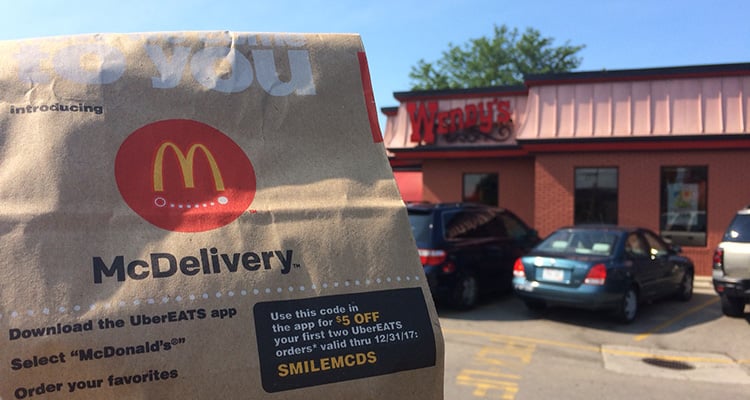A few weeks ago, Milwaukee restauranteurs blasted food delivery companies like Grubhub, Postmates, and DoorDash for adding their businesses without their permission. Now, according to an upcoming Public Works Committee agenda, a proposed ordinance would add a $0.60 service fee to all deliveries made by such companies. The fee, which would be imposed on the consumer and eventually remitted to the city by the company, would be used “for street maintenance and to supplement non-rail-based public transportation within the city.” Sorry, The Hop!
“The purpose of this section is to provide the department of public works sufficient resources to maintain public streets and to reduce added wear and tear on public streets arising from the proliferation of on-demand food delivery services,” reads the proposal, which is sponsored by Alderwoman Nikiya Dodd. “This will be accomplished by applying funds generated from a food delivery network service fee to street maintenance and increasing access to public transportation.”
The proposal is set to be discussed at the next Public Works Committee meeting, January 8 at 9 a.m. We’ve reached out to Ald. Dodd for further comment.
The full text of the proposal is below. Also, here’s a link to the time we ordered McDonald’s via UberEats and everyone got mad at us.
Analysis
This ordinance establishes a municipal service fee on food delivery network services. Fee revenues shall be used for street maintenance and to supplement non-rail-based public transportation within the city.Body
The Mayor and Common Council of the City of Milwaukee do ordain as follows:Part 1. Section 304-24.5 of the code is created to read:
304-24.5. Food Delivery Network Services. 1. PURPOSE. The purpose of this section is to provide the department of public works sufficient resources to maintain public streets and to reduce added wear and tear on public streets arising from the proliferation of on-demand food delivery services. This will be accomplished by applying funds generated from a food delivery network service fee to street maintenance and increasing access to public transportation.
2. DEFINITIONS. In this section:
a. “Customer” means an individual who uses a food delivery network company’s digital network to connect to a participating driver for food delivery network services.
b. “Digital network” means any Internet site or online-enabled application, software, or system that permits the prearrangement of food delivery network services.
c. “Food delivery network company” means a business that, for compensation, uses a digital network to connect customers to participating drivers for the purpose of providing food delivery network services to those customers.
d. “Food delivery network services” means collecting ready-to-eat food from a third-party establishment and delivering that food to a customer in the participating driver’s personal vehicle. A participating driver is considered to be engaged in food delivery network services beginning when the participating driver accepts a customer’s request for food delivery received through a food delivery network company’s digital network, continuing while the participating driver collects ready-to-eat food from a third party establishment and transports that food in the participating driver’s personal vehicle, and ending when the food is delivered to the customer.
e. “Participating driver” means an individual who does both of the following:
e-1. Pays a fee to a food delivery network company to be connected to a customer for the purpose of engaging in food delivery network services.
e-2. Uses a personal vehicle to engage in food delivery network services for compensation.
f. “Personal vehicle” means a motor vehicle that satisfies both of the following conditions:
f-1. A participating driver owns, leases, or is otherwise authorized to use the motor vehicle.
f-2. The motor vehicle is not a taxicab, limousine, shuttle, or other for-hire vehicle or a commercial motor vehicle.
g. “Ready-to-eat food” means restaurant-style food that is offered or prepared for sale and is ready for consumption, regardless of whether consumption is on the premises where the food is sold.
h. “Third-party establishment” means a preparer or seller of ready-to-eat food which does not employ, contract with or direct the actions of a participating driver.
3. FOOD NETWORK DELIVERY SERVICE FEE. A street maintenance fee of $0.60 shall be imposed on a customer of a food delivery network company for a food delivery network service that originates at a third-party establishment in the city or for a food delivery network service that terminates with a delivery to a customer in the city.
4. FEE COLLECTION AND REMITTANCE. The required fee shall be collected from the customer by the food delivery network company and remitted to the city by the food delivery network company on behalf of the customer. A food delivery network company shall remit fees owed to the city on a quarterly basis.
5. REVENUE. Revenues collected under this section shall be deposited in a street maintenance fund. Revenues in the fund shall be used only to defray city costs for street maintenance activities and to supplement non-rail-based public transportation within the city.

